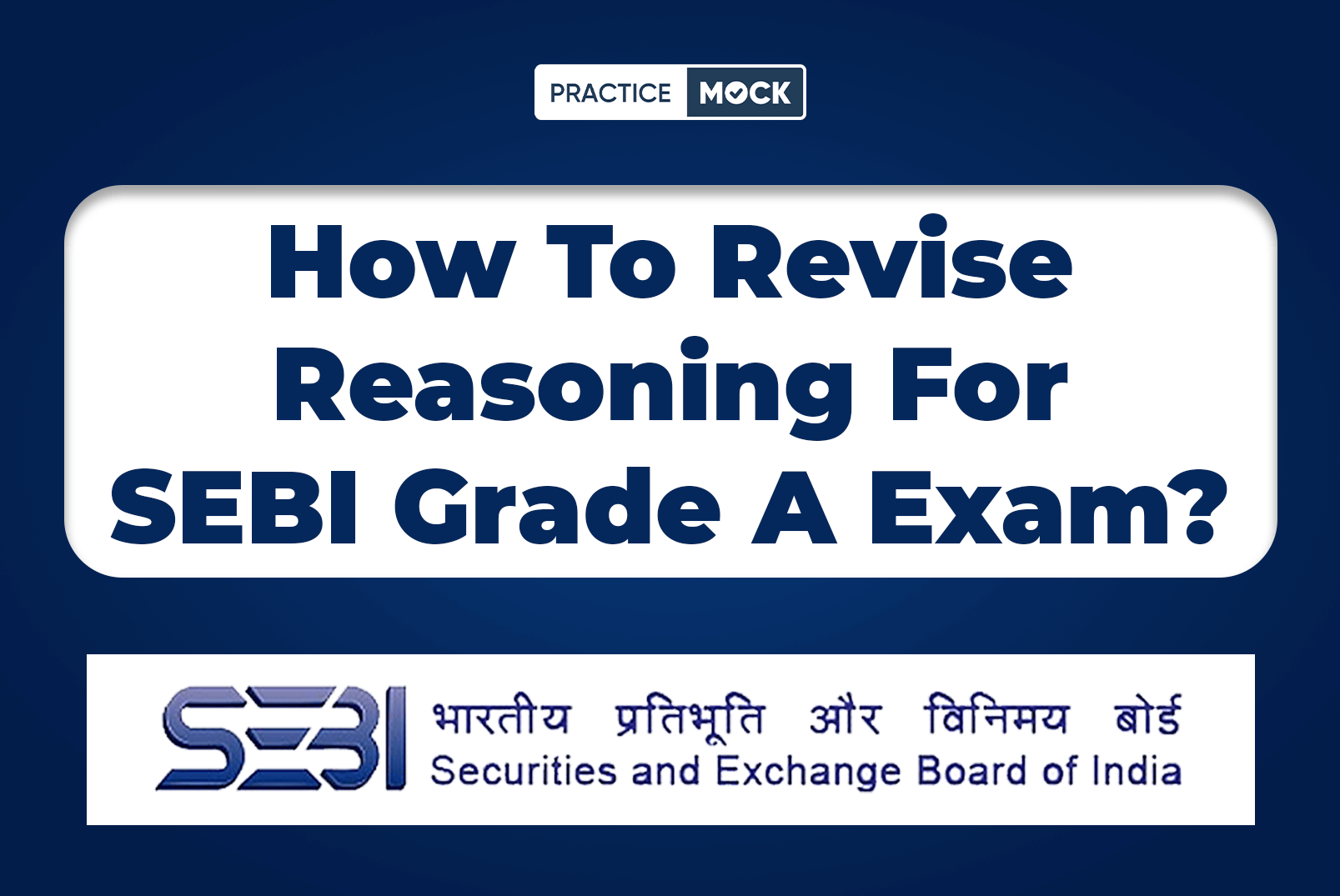Reasoning Section is an integral part of candidates taking SEBI Grade A Phase 1 Exam 2024. The Securities & Exchange Board Of India will conduct SEBI Grade A Phase 1 on 27th July 2024 through online mode. Candidates get 20 questions from Reasoning paper carrying a weightage of 25 marks in Phase 1. These are objective-based questions to be attempted in the online paper. Candidates should be happy to know that there is no sectional cut off in SEBI Grade A. Meanwhile, they can plan strategies to get sufficient attempts in Paper 1 subject Reasoning to achieve the qualifying cut off. Here are some tips and tricks mentioned in the blog to guide candidates in revising Reasoning for SEBI Grade A Paper 1.
Important Topics To Revise In Reasoning For SEBI Grade A Exam
Candidates should begin final revision in Reasoning for SEBI Grade A Exam with important topics. Go through the combination of the topics carrying weightage in Phase 1 (Paper 1). Revise all the important and solve questions to improve your speed and accuracy improving your Reasoning paper scores. Check the list of topics to revise in Reasoning paper.
- Puzzles & Seating Arrangement
- Coding Decoding
- Inequality
- Blood Relation
- Meaningful Word
- Forward & Backward
- Odd-One-Out
Reasoning Revision Tips For SEBI Grade A Paper 1
Aspirants should focus on practicing logical and analytical topic questions for Reasoning. If we consider past paper trends, we can expect 10-12 questions from Puzzles and Seating Arrangement section. Focus on other topics in Reasoning by following tips and tricks for Paper 1.
- Improve Analytical & Logical Skills: Candidates should begin improving analytical and logical skills in Reasoning Paper for SEBI Grade A Paper1. Map your revision schedule for notes revision to recall important topics from an exam perspective. It can help to improve your scores in the actual exam.
- Solve Puzzles Regularly: Make your routine to solve puzzles regularly. Divide your time to give 2 to 3 hours atleast to Reasoning section. A daily schedule for revision can help you to know your strong and weak areas for performance improvement.
- Revise Reasoning Notes: Don’t miss to revise your Reasoning notes regularly for SEBI Grade A Paper 1. Give your morning time in the last revision round to revise Reasoning topics. So that, you can recall important topics for the exam.
- Practice SEBI Grade A Previous Year Questions: Get through the questions trend only by practicing SEBI Grade A Previous Year Question Papers. These papers cover questions asked in the last years of SEBI Grade A Phase 1 Exam.
- Solve Mock Tests: SEBI Grade A Mock Tests are designed on the latest paper pattern. Candidates solving mocks get an idea of real exam pattern and time limit. You can map your strategies for attempting the actual exam.
- Assess Your Performance: Give time in your schedule in the revision round by assessing your SEBI Grade A Mocks attempted. Check your performance, marks scored, and tips and tricks to get quick attempts in Phase 1. Avoid committing silly mistakes not to lose marks 0.25 in negative marking.
- Improve Time Management: Candidates focus on attempting questions quickly and correctly in SEBI Grade A Paper 1. You can achieve speed and accuracy in solving Reasoning questions by practicing mock tests. It is the mimic of a real exam which allows you to know your mistakes and improve your performance.
Takeaway
Candidates should follow the tips and tricks as mentioned in How To Revise Reasoning for SEBI Grade A Exam blogpost. This blog is designed with a pattern to guide candidates in revising topics for the Reasoning paper. Map your routine revision schedule in revising all important topics and solving questions. Assess your performance and avoid mistakes in the real exam. Stay calm and motivated so that, you can achieve your target scores. A calm mindset can function efficiently to tackle tricky questions.
- Sign Up on Practicemock for Updated Current Affairs, Free Topic Tests and Free Mini Mocks
- Sign Up Here to Download Free Study Material
Free Mock Tests for the Upcoming Exams
- IBPS PO Free Mock Test 2024
- RBI Grade B Free Mock Test 2024
- IBPS SO Free Mock Test 2024
- NABARD Grade A Free Mock Test 2024
- SSC CGL Free Mock Test 2024
- IBPS Clerk Free Mock Test 2024
- IBPS RRB PO Free Mock Test 2024
- IBPS RRB Clerk Free Mock Test 2024
- RRB NTPC Free Mock Test 2024
- SSC MTS Free Mock Test 2024
- SSC Strenographer Free Mock Test 2024
- GATE Mechanical Free Mock Test 2024
- GATE Civil Free Mock Test 2024
- RRB ALP Free Mock Test 2024
- SSC CPO Free Mock Test 2024
- AFCAT Free Mock Test 2024
- SEBI Grade A Free Mock Test 2024
- IFSCA Grade A Free Mock Test 2024
- RRB JE Free Mock Test 2024
- Free Banking Live Test
- Free SSC Live Test



